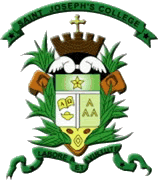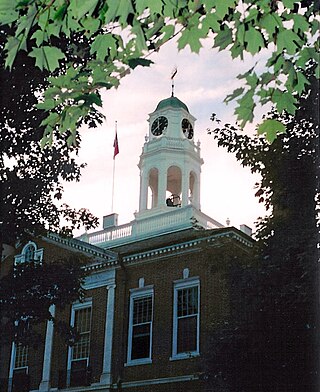Education in Quebec is governed by the Ministry of Education and Higher Education. It was administered at the local level by publicly elected French and English school boards, changed in 2020 to school service centres. Teachers are represented by province-wide unions that negotiate province-wide working conditions with local boards and the provincial government of Quebec.

Secondary education is the last six or seven years of statutory formal education in the United States. It culminates with twelfth grade. Whether it begins with sixth grade or seventh grade varies by state and sometimes by school district.

St. Joseph's College also referred to by its acronym SJC is an elite Catholic all-boys secondary education institution run by the Institute of the Brothers of the Christian Schools in Central Mid-Levels district, Hong Kong. It was established by the French De La Salle Christian Brothers on 7 November 1875. It is the oldest Catholic boys' secondary school and one of the leading boys' schools in Hong Kong. It typically has about 1,000 students. Subjects are taught in English, except for Chinese-related subjects and French and Japanese language studies.
Education in Malaysia is overseen by the Ministry of Education. Although education is the responsibility of the Federal Government, each state and federal territory has an Education Department to co-ordinate educational matters in its territory. The main legislation governing education is the Education Act 1996.

A private school is a school not administered or funded by the government, unlike a public school.

The system of education in Uganda has a structure of 7 years of primary education, 6 years of secondary education, and 3 to 5 years of post-secondary education. Education in Uganda is administered in English. All throughout the levels in the education structure, modules are taught and assessed in English. The government of Uganda recognizes education as a basic human right and continues to strive to provide free primary education to all children in the country. However, issues with funding, teacher training, rural populations, and inadequate facilities continue to hinder the progress of educational development in Uganda. Girls in Uganda are disproportionately discriminated against in terms of education; they face harsher barriers when trying to gain an education and it has left the female population disenfranchised, despite government efforts to close the gap.
Queen's College, Lagos, is a government-owned girls' secondary (high) school with boarding facilities, situated in Yaba, Lagos, Nigeria. Often referred to as the "sister college" of King's College, Lagos, it was founded on October 10, 1927, when Nigeria was still a British colony.
Education in Norway is mandatory for all children aged from 6 to 16. Schools are typically divided into two divisions: primary and lower secondary schooling. The majority of schools in Norway are municipal, where local governments fund and manage administration. Primary and lower secondary schools are available free of charge for all Norwegian citizens as a given right.
Sacred Heart Canossian College is a Catholic, all-girls' school established at Robinson and Caine Roads, Mid-Levels, Hong Kong. Founded in 1860, the school currently serves under 2,000 students and has been identified as one of the most prestigious schools in Hong Kong.
Education in Oman is provided free of charge up to end of secondary education, though attendance is not mandatory at any level. In 1970 there were only three formal schools with 900 students in the whole state. Oman's national educational program expanded rapidly during the 1970s and the 1980s, with the Kingdom of Saudi Arabia sending teachers on its own expense during that time period. In 2006–2007 about 560,000 students attended 1053 public schools. The number of students in private schools is about 65,000. There are also extensive programmes to combat adult illiteracy. Sultan Qaboos University, the only national university near Muscat, was founded in 1986, and in 2006 it had 13,500 students. The Human Development Report found the literacy rate to be 93.0% in adults, up from 54.7% in 1990. For the same period, the youth literacy rate increased from 85.6 to 97.3%. Public expenditure on education was reported to be 4.6% of GDP and 26.1% of total government spending.
St Patrick's Grammar School, Armagh, is a Roman Catholic boys' non-selective voluntary grammar school in the city of Armagh, Northern Ireland. The present-day school was officially opened on Thursday, 27 October, 1988, by the late Cardinal Tomás Ó Fiaich, the then Chairman of the Board of Governors, and was the result of the amalgamation of two of Northern Ireland's oldest grammar schools, Christian Brothers' Grammar School and St. Patrick's College, both of which had traditions stretching back as far as the 1830s.

St Ursula's College, Yeppoon, is the only all-girls, Catholic day and boarding secondary school in Central Queensland, Australia.

Abbey College in Malvern, Worcestershire, England, is a small boarding school providing secondary education to a diverse and international student body. The present college was founded in 1979 on a site that had been used for education since 1874. The Abbey School occupied the premises between 1908 and 1979
St. Henry's College Kitovu (SHACK), is a boys-only government-aided boarding middle and high school in Uganda, the third-largest economy in the East African Community.
John Chrysestom Muyingo is a Ugandan educator and politician. He is the State Minister for Higher Education in the Ugandan Cabinet. He was appointed to that position on 6 June 2016. He previously served as the State Minister for Primary Education from 1 March 2015 until 5 June 2016. Before that, from 27 May 2011 until 1 March 2015, he served as the State Minister for Higher Education, having replaced Mwesigwa Rukutana in May 2011. Muyingo was also the elected Member of Parliament for Bamunanika County, Luweero District. In the 2021 general elections he lost the seat to his former campaign manager and personal assistant, Robert Ssekitoleko who run on the National Unity Platform party ticket.
Jinja College is a government-Aided boys' boarding school, school of O and A levels, found in Jinja, Uganda.

Teso College Aloet (TCA) was established in 1953. Teso College is an all-male preparatory school, a boarding school, located in Aloet, Soroti, in Uganda. As of 2014, Teso College has 1,574 students. Over 30,000 students have graduated from TCA since its establishment. Teso College ranks in the top 50 in the Ugandan national examinations performance listing.
Luweero Secondary School, also Luwero Secondary School, whose full name is Luweero Senior Secondary School, is a combined middle and high school, in the town of Luweero, in Luweero District, in the Buganda Region of Uganda. The school is a Church of Uganda funded and owned, government-aided, mixed, day and boarding school.

St. Denis Ssebugwawo Secondary School is a Ugandan mixed day and boarding school, located in Ggaba, Kampala District.








